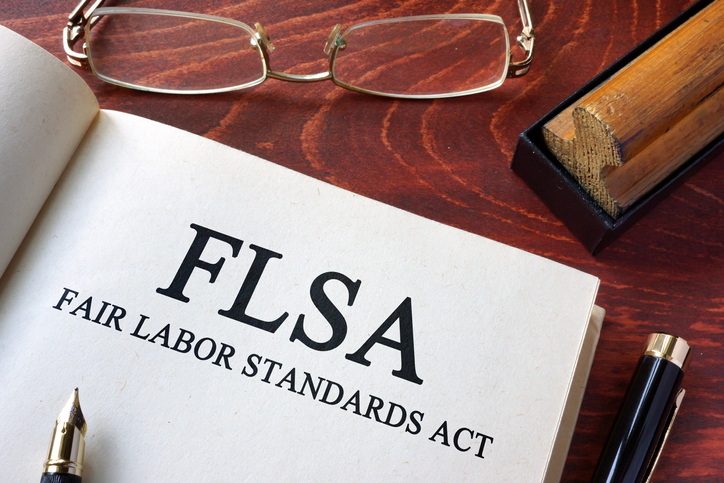The Importance of Properly Classifying Employees Under the Fair Labor Standards Act
One of the most common mistakes employers make when it comes to wage and hour issues under the Fair Labor Standards Act (“FLSA”) is improperly classifying nonexempt employees as exempt. Broadly speaking, employees are divided into two categories under the FLSA: exempt and nonexempt. The key difference between exempt and nonexempt employees is that nonexempt workers are entitled to certain protections under the FLSA, a federal law that establishes minimum wage and overtime requirements.
In order to qualify as an exempt employee under the FLSA, an employee must meet certain salary and job duties criteria. A common misconception among employers is that paying an employee a salary alone is sufficient to qualify them as exempt under the FLSA. However, an employee is not exempt from the FLSA’s overtime requirements simply because she/he is paid a salary. Such employee also must meet one of the job duties tests outlined in the FLSA, which requires a fact-specific and detailed inquiry.
The Most Common Exemptions
The most common exemptions are collectively referred to as the “White-Collar Exemptions”. They require a minimum weekly salary of $684 per week, along with performing certain job duties and functions. Titles and job descriptions are not determinative and often irrelevant to the analysis. The duties and functions required for an employee to qualify as exempt under the White-Collar Exemptions are as follows:
Administration Exemption:
- The employee’s primary duty must be the performance of office or non-manual work directly related to the management or general business operations of the employer or the employer’s customers; and
- The employee’s primary duty includes the exercise of discretion and independent judgment with respect to matters of significance.
Professional Exemption:
- The employee’s primary duty must be the performance of work requiring advanced knowledge, defined as work which is predominantly intellectual in character, and which includes work requiring the consistent exercise of discretion and judgment;
- The advanced knowledge must be in a field of science or learning; and
- The advanced knowledge must be customarily acquired by a prolonged course of specialized intellectual instruction.
Executive Exemption:
- The employee’s primary duty must be managing the enterprise, or managing a customarily recognized department or subdivision of the enterprise;
- The employee must customarily and regularly direct the work of at least two or more other full-time employees; and
- The employee must have the authority to hire or fire other employees, or the employee’s suggestions and recommendations as to the hiring, firing, advancement, promotion or any other change of status of other employees must be given particular weight.
Highly Compensated Employees:
- Highly compensated employees performing office or non-manual work and paid total annual compensation of $107,432 or more (which must include at least $684 per week paid on a salary or fee basis) are exempt from the FLSA if they customarily and regularly perform at least one of the duties of an exempt executive, administrative or professional employee identified in the standard tests for exemption.
Anticipated Increase of the Salary Basis Threshold
While these are the current guidelines for the White-Collar Exemptions, there will likely be some impactful changes made by the Biden administration in the coming months. In May, the Department of Labor (“DOL”) is expected to publish a “Notice of Proposed Rule Making” which will propose significant changes to the current exemptions under the FLSA. Most significantly, it is expected that the current salary threshold will be increased from $684/week, although neither the White House nor the Department of Labor has indicated what the increase will be. Given the Biden administration’s previously stated goal of making more Americans eligible for overtime, it is likely safe to plan for a substantial increase in the salary threshold – potentially $800 – $1,000/week.
The DOL’s proposed rule might also include additional changes, such as adjustments to the exempt duties tests outlined above; automatic, periodic increases to the salary threshold based on market data; and/or an additional rate increase for highly compensated employees. As mentioned above, highly compensated employees who currently earn at least $107,432 a year are subject to a reduced duties test.
Once the proposed rule has been published, the DOL will allow a period of time for interested parties and the general public to provide their comments. It is anticipated that worker advocacy groups will be vocal in their support of a salary threshold increase, whereas many business groups will oppose an increase. Following the comment period, the DOL may make modifications to the proposed rule and then will issue its final rule, which will include an effective date.
What can I do to prepare for these changes?
Although the details of the proposed rule remain unknown for now and the DOL will almost certainly delay its effective date well into the future in order to give employers sufficient time to come into compliance with the rule, it is crucial for employers to be aware of and plan for possible changes this year. If the minimum salary threshold for exemptions is increased, employers must decide whether to raise their current exempt employees’ salaries to meet the new minimum or convert them to non-exempt. Now is also a good time to review your current employee classifications to make sure your employees are properly classified as exempt or nonexempt. It is a high burden for employers to prove that an employee is exempt, and the penalties are severe for misclassifying such an employee. Employers could potentially be liable for back pay, liquidated damages, civil penalties, and attorney’s fees. If you have any questions about exemptions under the FLSA or you wish to review your current policy, please feel free contact your FGKS Law attorney.





